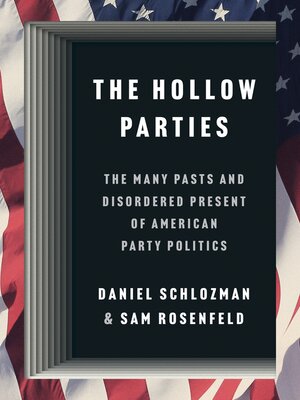The Hollow Parties
ebook ∣ The Many Pasts and Disordered Present of American Party Politics · Princeton Studies in American Politics: Historical, International, and Comparative Perspectives
By Daniel Schlozman

Sign up to save your library
With an OverDrive account, you can save your favorite libraries for at-a-glance information about availability. Find out more about OverDrive accounts.
Find this title in Libby, the library reading app by OverDrive.



Search for a digital library with this title
Title found at these libraries:
| Library Name | Distance |
|---|---|
| Loading... |
A major history from the Founding to our embittered present that "explains the void" (Politico) at the center of America's political parties
Featured on The Ezra Klein Show and The Weekly Show with Jon Stewart
America's political parties are hollow shells of what they could be, locked in a polarized struggle for power and unrooted as civic organizations. The Hollow Parties takes readers from the rise of mass party politics in the Jacksonian era through the years of Barack Obama and Donald Trump. Today's parties, at once overbearing and ineffectual, have emerged from the interplay of multiple party traditions that reach back to the Founding.
Daniel Schlozman and Sam Rosenfeld paint unforgettable portraits of figures such as Martin Van Buren, whose pioneering Democrats invented the machinery of the mass political party, and Abraham Lincoln and other heroic Republicans of that party's first generation who stood up to the Slave Power. And they show how today's fractious party politics arose from the ashes of the New Deal order in the 1970s. Activists in the wake of the 1968 Democratic National Convention transformed presidential nominations but failed to lay the foundations for robust, movement-driven parties. Instead, modern American conservatism hollowed out the party system, deeming it a mere instrument for power.
Party hollowness lies at the heart of our democratic discontents. With historical sweep and political acuity, The Hollow Parties offers powerful answers to pressing questions about how the nation's parties became so dysfunctional—and how they might yet realize their promise.







